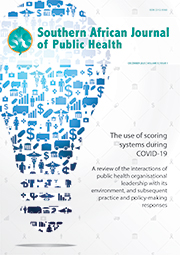Research

Lessons for the COVID-19 response from a multidrugresistant tuberculosis study in South Africa: How public health promotion can reach vulnerable young women
Abstract
Background. As the world grapples with the COVID-19 pandemic, lessons from responding to diseases that are endemic to Africa, such as HIV/AIDS, malaria, yellow fever, Lassa fever and Ebola, can inform responses to the new challenge. Gaps in and successes of South Africa (SA)’s established tuberculosis (TB) management programme have potential to inform COVID-19 responses.
Objectives. To present the findings of a 2019 study that assessed how communication can contribute to improving health outcomes among young women with multidrug-resistant TB (MDR-TB) in SA. Methods. Primary qualitative data were collected from 20 purposefully selected participants in eThekwini Metro, KwaZulu-Natal Province. Data were collected through focus group discussions with women with MDR-TB, and key informant interviews with their family members, health workers and KwaZulu-Natal health department personnel.
Results. The study assessed how age, gender, socioeconomic status, geographic location and comorbidity converge to influence susceptibility to communicable diseases and risk of mortality, and proposes that vulnerabilty factors be incorporated into both MDR-TB and COVID-19 responses.
Conclusion. In the early stages of the COVID-19 pandemic, much is unknown about the incubation period and infection transmission modes, and there have been suggestions that asymptomatic people may be infectious. In highly populated urban areas, television and radio (local soap operas, dramas and hard news programmes), social media (Facebook and WhatsApp) and information from children are the best mediums for reaching young women to provide integrated public health education about both MDR-TB and COVID-19.
Author's affiliations
P C Mugoni, Howard College, University of KwaZulu-Natal, Durban, South Africa
Full Text
Cite this article
Article History
Date published: 2020-08-14
Article Views
Full text views: 2675

.jpg)


Comments on this article
*Read our policy for posting comments here